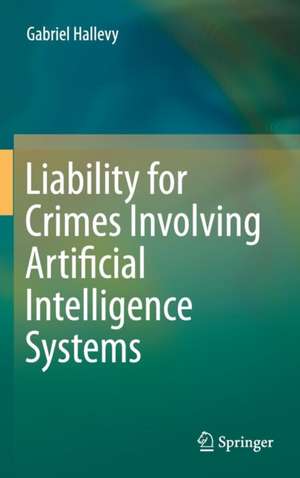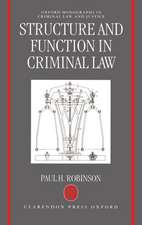Liability for Crimes Involving Artificial Intelligence Systems
Autor Gabriel Hallevyen Limba Engleză Hardback – 18 noi 2014
In most modern countries, unmanned vehicles, sophisticated surgical systems, industrial computing systems, trading algorithms and other artificial intelligence systems are commonly used for both industrial and personal purposes. The question of legal liability arises when something goes wrong, e.g. the unmanned vehicle is involved in a car accident, the surgical system is involved in a surgical error or the trading algorithm is involved in fraud, etc. Who is to be held liable for these offenses: the manufacturer, the programmer, the user, or, perhaps, the artificial intelligence system itself?
The concept of liability for crimes involving artificial intelligence systems has not yet been widely researched. Advanced technologies are forcing society to face new challenges, both technical and legal. The idea of liability in the specific context of artificial intelligence systems is one such challenge that should be thoroughly explored.
| Toate formatele și edițiile | Preț | Express |
|---|---|---|
| Paperback (1) | 779.89 lei 6-8 săpt. | |
| Springer International Publishing – 22 sep 2016 | 779.89 lei 6-8 săpt. | |
| Hardback (1) | 785.86 lei 6-8 săpt. | |
| Springer International Publishing – 18 noi 2014 | 785.86 lei 6-8 săpt. |
Preț: 785.86 lei
Preț vechi: 958.37 lei
-18% Nou
Puncte Express: 1179
Preț estimativ în valută:
150.38€ • 157.40$ • 125.16£
150.38€ • 157.40$ • 125.16£
Carte tipărită la comandă
Livrare economică 01-15 aprilie
Preluare comenzi: 021 569.72.76
Specificații
ISBN-13: 9783319101231
ISBN-10: 3319101234
Pagini: 370
Ilustrații: VIII, 257 p.
Dimensiuni: 155 x 235 x 22 mm
Greutate: 0.55 kg
Ediția:2015
Editura: Springer International Publishing
Colecția Springer
Locul publicării:Cham, Switzerland
ISBN-10: 3319101234
Pagini: 370
Ilustrații: VIII, 257 p.
Dimensiuni: 155 x 235 x 22 mm
Greutate: 0.55 kg
Ediția:2015
Editura: Springer International Publishing
Colecția Springer
Locul publicării:Cham, Switzerland
Public țintă
ResearchCuprins
Chapter 1 – Artificial Intelligence Technology and Modern Technological Delinquency.- Chapter 2 – Basic Requirements of Modern Criminal Liability.- Chapter 3 – External Element Involving Artificial Intelligence Systems.- Chapter 4 – Positive Fault Element Involving Artificial Intelligence Systems.- Chapter 5 – Negative Fault Elements and Artificial Intelligence Systems.- Chapter 6 – Punishability of Artificial Intelligence Technology.
Recenzii
“This pioneering work illustrates how emerging legal doctrines build on the past. … anyone involved in the development of artificial intelligence will find profitable reading. … The book carefully and logically moves into legally unknown territory. Over the next few years, given the accelerating advances in artificial intelligence, Hallevy’s thoughtful analysis will doubtless be considered foundational. Readers will not be disappointed in his study.” (Brad Reid, Computing Reviews, April, 2015)
Textul de pe ultima copertă
The book develops a general legal theory concerning the liability for offenses involving artificial intelligence systems. The involvement of the artificial intelligence systems in these offenses may be as perpetrators, accomplices or mere instruments. The general legal theory proposed in this book is based on the current criminal law in most modern legal systems.
In most modern countries, unmanned vehicles, sophisticated surgical systems, industrial computing systems, trading algorithms and other artificial intelligence systems are commonly used for both industrial and personal purposes. The question of legal liability arises when something goes wrong, e.g. the unmanned vehicle is involved in a car accident, the surgical system is involved in a surgical error or the trading algorithm is involved in fraud, etc. Who is to be held liable for these offenses: the manufacturer, the programmer, the user, or, perhaps, the artificial intelligence system itself?
The concept of liability for crimes involving artificial intelligence systems has not yet been widely researched. Advanced technologies are forcing society to face new challenges, both technical and legal. The idea of liability in the specific context of artificial intelligence systems is one such challenge that should be thoroughly explored.
In most modern countries, unmanned vehicles, sophisticated surgical systems, industrial computing systems, trading algorithms and other artificial intelligence systems are commonly used for both industrial and personal purposes. The question of legal liability arises when something goes wrong, e.g. the unmanned vehicle is involved in a car accident, the surgical system is involved in a surgical error or the trading algorithm is involved in fraud, etc. Who is to be held liable for these offenses: the manufacturer, the programmer, the user, or, perhaps, the artificial intelligence system itself?
The concept of liability for crimes involving artificial intelligence systems has not yet been widely researched. Advanced technologies are forcing society to face new challenges, both technical and legal. The idea of liability in the specific context of artificial intelligence systems is one such challenge that should be thoroughly explored.
Caracteristici
This is the only book to address a general theory towards the criminal liability of artificial intelligence technology and the implications of such liability, including derivative criminal liability, including tangible and non-tangible artificial intelligence systems and including all types of offenses The book develops a complete thorough theory of criminal liability for offenses committed by artificial intelligence entities and by individuals using artificial intelligence entities This is a concrete, operative, and workable theory of criminal law The book addresses to wide-range population, and not only to legal professionals or computer experts


















